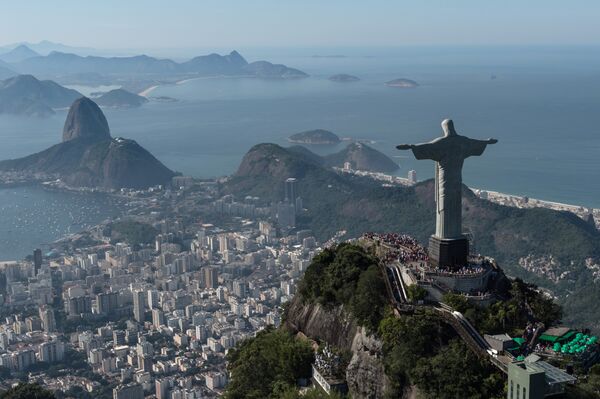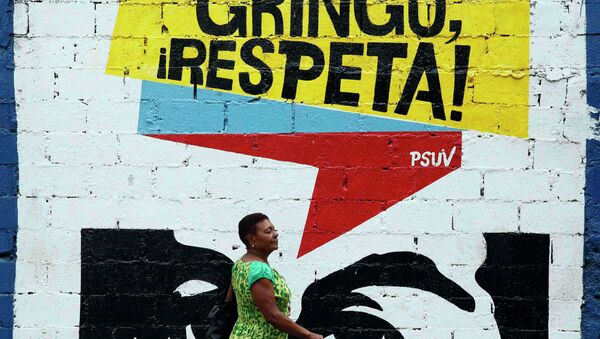Latin America has recently garnered the attention of global powers. While the US is seemingly struggling to pull South American countries into its orbit in accordance with the old Monroe Doctrine of 1823, China is beefing up its presence in the region much to Washington's concern. Beijing has largely boosted trade and investment initiatives in Latin America since 2008. Meanwhile, since the beginning of his presidency, Donald Trump has increased pressure on left-wing governments of the region, most notably, Venezuela and Cuba. Under these economic and geopolitical circumstances, another rising Asian giant, India, is maintaining ties with Latin America and the Caribbean (LAC) region. Thus, New Delhi continues to cooperate with Venezuela despite the US sanctions policy and opposes Washington's embargo on Cuba.
Speaking to Sputnik, Dr. Sanjay Badri-Maharaj, an Indian expert on Latin American issues, and Amrita Dhillon, a foreign policy analyst and founding editor of The Kootneeti, shared their views on India's foreign strategy with regard to Latin America.
Sputnik: China is expanding its presence in Latin America by launching investment projects and building infrastructure. Being a rising Asian giant, is India planning to boost ties with South America? What has been done in this respect so far? Do China and India's interests clash in the region?
Dr. Sanjay Badri-Maharaj: India's efforts to boost ties in South America are focused on trade. India is Latin America's sixth most important export destination. "Focus: LAC" remains a key initiative but it is very much a trade-oriented mission. ["Focus: LAC" is a program kicked off by India's Department of Commerce in 1997.]
Indian businesses do invest in the region — rather than major government-to-government investments — to the tune of US$15 billion and employ 35,000 people in the region.
The two countries have adopted differing approaches. China seeks to control assets — mining, infrastructure, etc. — while India looks to invest for profit and to a lesser extent for goodwill.
Is enough being done by India? No.
The Indian bureaucracy sees everything as transactional and gets bogged down by minutiae, failing to see the bigger picture. There is also a shortfall in diplomatic representation where more South American countries have embassies in India than vice versa.
Sputnik: What Latin American countries does India conduct business with? What are India's major exports and services provided to the region? What does India buy from the continent? What major Latin American projects and initiatives are Indian companies currently involved in?
Dr Sanjay Badri-Maharaj: Indian investment in the region exceeds $15 billion in the information technology (IT), pharmaceuticals, agrochemicals, mining, energy, and manufacturing sectors. Led by such firms as Tata Consultancy Services (TCS), Dr. Reddy's Laboratories (pharma), United Phosphorus (agrochemicals), Shree Renuka Sugars, Havells Sylvania (lighting equipment), Videocon (television), and ONGC Videsh (oil), Indian companies have established a presence in the LAC region and currently Indian companies employ some 35,000 Latin Americans.
India's major trading partners include Brazil, Venezuela and Mexico with substantial trade also undertaken with Chile, Ecuador, Peru, Colombia and Argentina.
India's major imports from the region are crude oil, vegetable oil, gold and mineral ores. India's major exports to the region include vehicles and pharmaceuticals.

Sputnik: Latin American countries differ a lot from each other, especially in terms of political agenda. What South American political regimes has India historically been aligned with? What's New Delhi's attitude towards Washington's crackdown against Latin America's left-leaning governments, especially in Venezuela and Cuba?
Amrita Dhillon: That's how beautifully and wisely Indian policy has been crafted since independence: India maintains equal relations with its partners regardless of political ideology. Indian foreign policy is based on the pillars of Panchsheel [five principles of peaceful co-existence]. India still follows the aims of NAM [Non-Aligned Movement, established in 1961 in Belgrade, Yugoslavia] and prioritizes each NAM summit.
Washington can't dictate India on its policies to deal with other states, not only in Latin America but around the globe. For instance, despite the US pressure, India maintained its embassy in North Korea, which is another leftist government. Also, India distanced itself from the Trump administration's position on Cuba as it voted in favor of a UN resolution urging an end to the United States embargo on Cuba.
READ MORE: Red Lines: India Won't Axe S-400, Iran Port Project to Appease Trump — Analyst
India's stand could be seen during the International Solar Alliance (2018). Venezuelan President Nicolas Maduro was invited to the conference and held talks with PM Narendra Modi in which hydro-carbon partnership was one of the key areas.
Also, India is one of the largest buyers of Venezuelan crude oil. India's state-run Oil and Natural Gas Corporation (ONGC) has plans to invest further in the San Cristobal joint venture over the coming years in order to increase production.
READ MORE: Analysts on How US Invasion of Afghanistan, Libya and Syria Misfired on India
However, I would add that India's policies with respect to "left-leaning" governments are a bit of an anachronism which has not produced tangible trade or investment benefits. Furthermore, while India has interests in Venezuelan oil, pragmatism is required as an unstable government conducive to long-term prospects. Also, it should be noted that the Venezuelan Opposition-controlled National Assembly is required to ratify projects relating to the energy sector as per the Venezuelan constitution.
On the American policies of crackdown I would further like to point, apart from Latin America, coming to Russia, India has concluded the S-400 deal and the same will be conveyed to the US during the upcoming 'two-plus-two' talks that it is going ahead to the deal with Russia to procure a batch of S-400 Triumf air defence missile systems, notwithstanding the American sanctions on military transactions with Moscow.
The views and opinions expressed by the speakers do not necessarily reflect those of Sputnik.
Dr Sanjay Badri-Maharaj is an expert on Latin American issues. He was a Visiting Fellow at IDSA (New Delhi). Also, he is an independent defence analyst and attorney-at-law based in Trinidad and Tobago.
Amrita Dhillon is a foreign policy analyst and founding editor of The Kootneeti, a New Delhi-based multilingual publication on international relations and diplomacy. She's also an honorary fellow at Equilibrium Global — Buenos Aires (Argentina).




